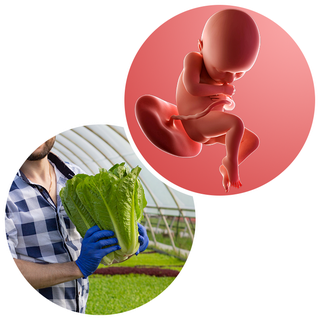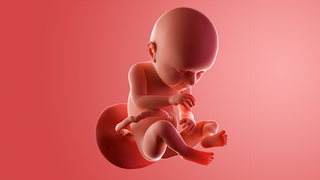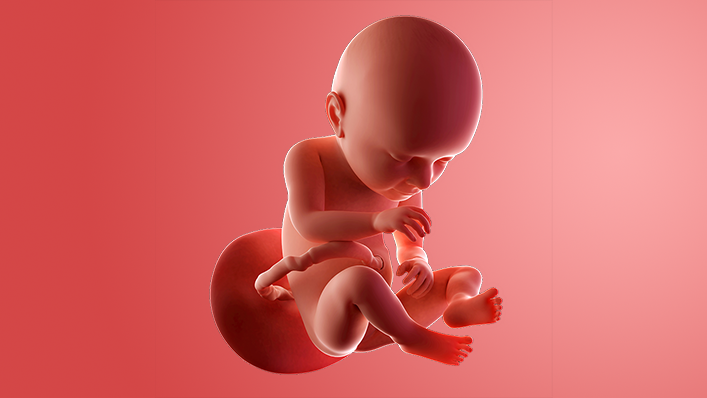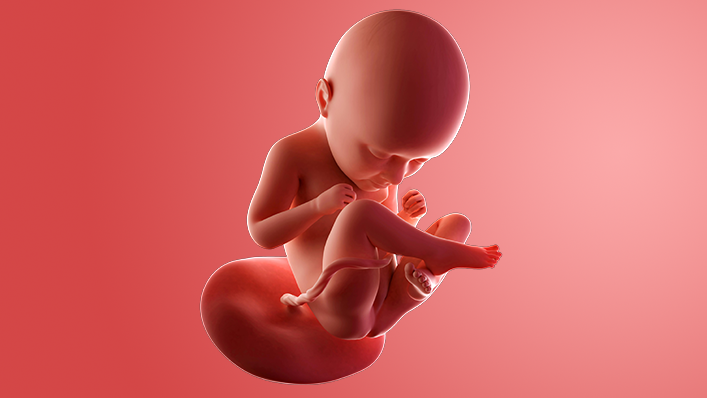- Week 28
- Week 29
- Week 30
- Week 31
- Week 32
- Week 33
- Week 34
- Week 35
- Week 36
- Week 37
- Week 38
- Week 39
- Week 40
- Week 41
Week 36
You'll have an antenatal appointment around now with your doctor or midwife. This will check on your blood pressure, urine, and the size of your bump.
You may not feel like going, as it's such an effort to get anywhere, but make them a priority.
These appointments save lives as they can pick up on changes in your body that you might not be aware of, such as very high blood pressure.
What's happening in my body?
Your baby may already have moved head down into your pelvis, which means that they're in position for labour (or "engaged"). However, this doesn't mean that labour's on the way – it could still be weeks away.
If your baby's not head down yet, then you may be offered external cephalic version (ECV).
This is where your doctor or midwife gently applies a helping hand to your bump to encourage the baby to turn – it's successful around half the time.
RSV vaccination
Have you had the RSV (respiratory syncytial virus) vaccine? It's usually offered at around week 28 but can be given later if needed, right up until you go into labour.
Having the vaccination can lower your baby's risk of a severe lung infection called bronchiolitis, which can make it difficult for your baby to breathe and feed. If you've not had it yet, speak to your midwife or a GP.
Common ways that babies are born
Here are the main ways of giving birth.
Vaginal birth after a caesarean section
It is possible to have a vaginal birth after a caesarean section – it depends on why you needed a caesarean before.
If there's no medical reason to stop you, then your chances of having a vaginal birth this time around are very good. Talk to your doctor or midwife about the pros and cons.
Baby slings and carriers
If you're thinking of buying a baby sling or carrier for when your baby arrives, make sure you know how to use one safely. You can find safety advice in our guide on what to buy for your newborn baby.
3rd trimester pregnancy symptoms (at 36 weeks)
Have you noticed a bit of wee leaking out when you laugh or cough? This is your body's way of preparing for the birth by relaxing the pelvic floor muscles around the bladder.
It may help to wear maternity pads – it's a good idea to stock up now as you'll need some after the birth. Also try to practise your pelvic floor exercises.
Your signs of pregnancy could also include:
- painless contractions around your bump, known as Braxton Hicks contractions
- sleeping problems (week 19 has information on feeling tired)
- stretch marks (week 17 has information on stretch marks)
- swollen and bleeding gums (week 13 has information on gum health during pregnancy)
- pains on the side of your baby bump, caused by your expanding womb ("round ligament pains")
- piles (week 22 has information on piles)
- headaches (read about headaches in pregnancy on NHS.uk)
- backache
- indigestion and heartburn (week 25 has information on digestive problems)
- bloating and constipation (week 10 has information on bloating)
- leg cramps (week 20 has information on how to deal with cramp)
- feeling hot
- dizziness
- swollen hands and feet
- urine infections
- vaginal infections (week 15 has information on vaginal health)
- darkened skin on your face or brown patches – this is known as chloasma or the "mask of pregnancy"
- greasier, spotty skin
- thicker and shinier hair
You may also experience symptoms from earlier weeks, such as:
- mood swings (week 8 has information on mood swings)
- morning sickness (week 6 has information on dealing with morning sickness)
- weird pregnancy cravings (week 5 has information on pregnancy cravings)
- a heightened sense of smell
- sore or leaky breasts (week 14 has information on breast pain) – a white milky pregnancy discharge from your vagina and light spotting (seek medical advice for any bleeding)
What does my baby look like?
Your baby, or foetus, is around 47.4cm long from head to heel. That's approximately the size of a romaine lettuce.
By now, your baby's lungs are probably mature enough to breathe outside the womb without any help.
Your baby will also be able to suck and digest breast milk. If you're not sure about breastfeeding yet, read about the benefits of breastfeeding.
Breastfeeding is good for your baby, as it helps to fight off infections. It's great for bonding and also burns around 300 calories a day. There's no reason the size of your breasts should affect your ability to breastfeed.

Action stations
You should start to prepare the things you will need during the birth now.
Make sure that your bag is packed and you have written down your hospital reference number and important phone numbers. Keep your notes where you can quickly grab them.
This week you could also...
This week's treat
How would you like to take a little holiday today?
One way of escaping, without leaving home, is to practise anxiety control. This can help you to relax your body and mind, and give you a release from the stresses of life.
Our Mental wellbeing audio guides will teach you the basics. Listen to this every day – and soon you'll find that you can take a mini break, whenever you choose.
Bon voyage!
More in week-by-week

Week 37
Your baby could come any day now – and this would not be considered early. Your baby is now "full term", which means that they're probably big enough, and mature enough, to survive in the outside world!
More in week-by-week guide to pregnancy


